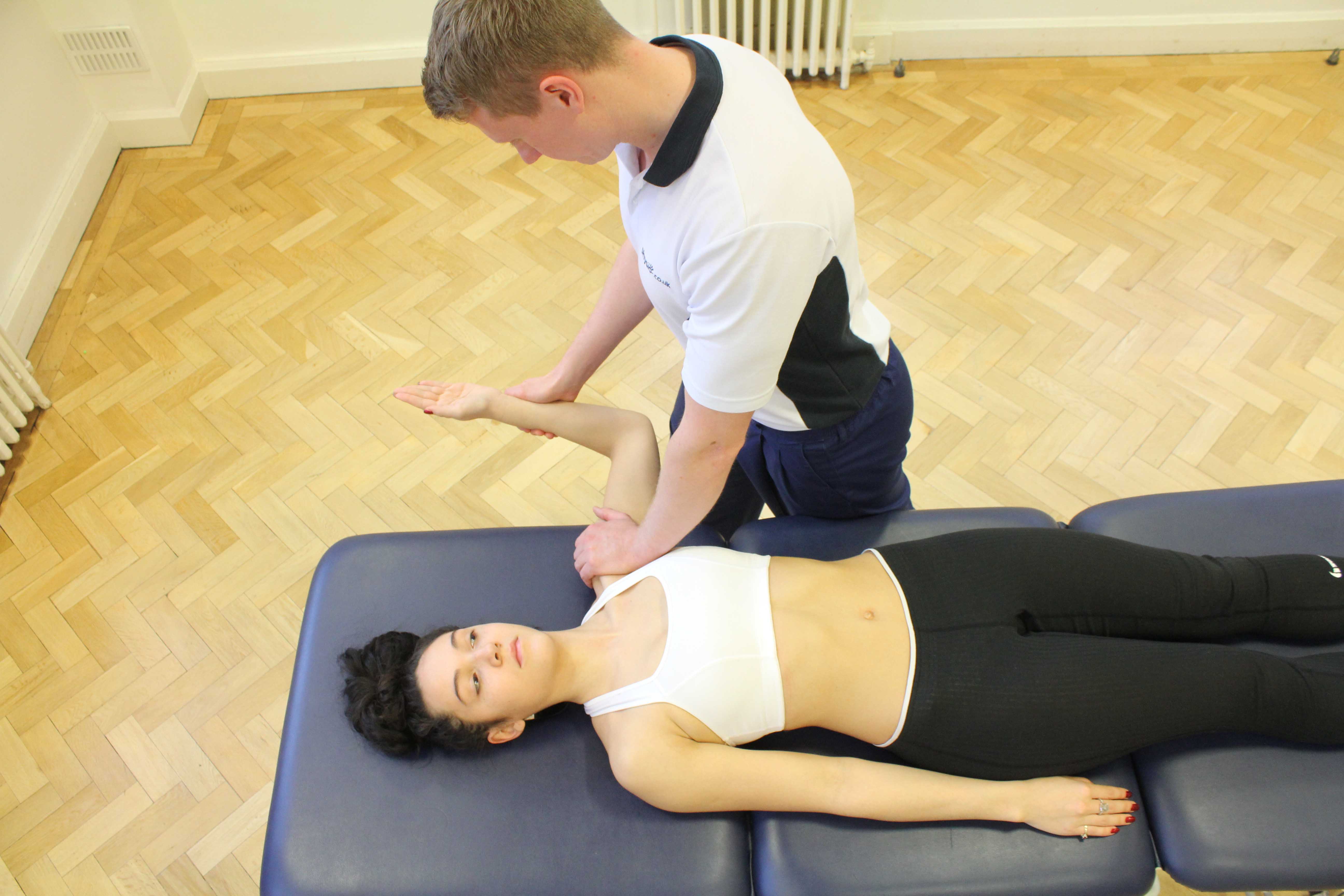What is rotator cuff tendinopathy?
The rotator cuff is a group of four small muscles that run from the shoulder blade to the top of the arm bone. They support and move the shoulder joint. The rotator cuff muscles attach to the arm bone by tendons. Inflammation and swelling within one or more of these tendons is known as rotator cuff tendinopathy. Physiotherapy is an excellent way to treat rotator cuff tendinopathy.
 Above: Mobilisation of the shoulder joint to relieve pain and stiffness
Above: Mobilisation of the shoulder joint to relieve pain and stiffnessHow does rotator cuff tendinopathy occur?
Rotator cuff tendinopathy is caused by overuse or injury to a tendon of one of the rotator cuff muscles. The most commonly affected tendon is that of the supraspinatus muscle. This muscle assists other muscles in raising the arm out to the side of the body. The supraspinatus tendon passes through a small space between the top of the arm bone and the point of the shoulder. In this space the tendon is susceptible to ‘wear and tear’. Repetitive use can cause the tendon to rub against the edges of the bony space resulting in microscopic tears within the tendon. This causes inflammation and swelling within the tendon.
What are the symptoms of rotator cuff tendinopathy?
Rotator cuff tendinopathy causes pain in the top of the upper arm. This usually develops gradually and is felt when you try to lift your arm into the air. Initially, the tendon may only be painful following exercise with an associated stiffness or tightness in the shoulder joint. These initial signs of rotator cuff tendinopathy are often ignored, as they disappear quickly with use of the arm or applying heat (i.e. a hot shower) over the shoulder. However, over time, the tendinopathy can worsen causing the pain within the tendon to become more intense and more and more frequent until it is present each time you lift your arm.
Other symptoms of rotator cuff tendinopathy includes:
What should I do if I have rotator cuff tendinopathy?
Rotator cuff tendinopathy does not normally get better on its own unless the cause is addressed. If you have or suspect you have rotator cuff tendinopathy, you should contact Physio.co.uk to arrange a physiotherapy assessment. In the meantime, you can begin initial treatment. This should consist of icing following exercise with a bag of frozen peas or crushed ice wrapped in a moist towel applied to the sore area for 15–20 minutes.
Physiotherapy treatment for rotator cuff tendinopathy.
Physiotherapy is very important in the treatment of a rotator cuff tendinopathy. Your physiotherapist can diagnose the problem and its severity, and determine an appropriate treatment plan. This often involves activity modification, soft tissue treatment such as massage and stretching, and the progression through a series of specific strengthening exercises. The physiotherapists at Physio.co.uk will also be able to assess and determine why you developed rotator cuff tendinopathy and address this during your recovery to prevent a re-occurrence when you return to full activity.
Other physiotherapy treatments may include:
What shouldn’t I do if I have rotator cuff tendinopathy?
If you have or suspect you have rotator cuff tendinopathy, you should not ignore it. Your pain may get better as you exercise; however, the exercise you are doing may be interfering with the healing process and causing further damage. If this occurs, your recovery may be prolonged and it may take a number of weeks or months for you to return to full fitness.
Are there any long-term effects of rotator cuff tendinopathy?
Rotator cuff tendinopathy does not produce any long-term effects if it is properly diagnosed and appropriately treated. If not, it can lead to prolonged pain in the upper arm and a prolonged lay-off from exercise.
To arrange a physiotherapy assessment call Physio.co.uk on 0330 088 7800 or book online.

 0330 088 7800
0330 088 7800





































